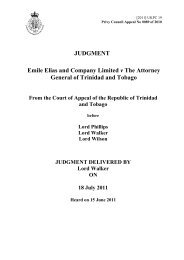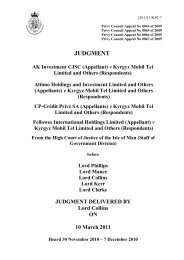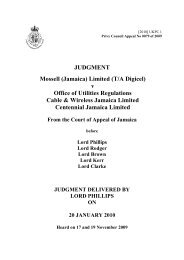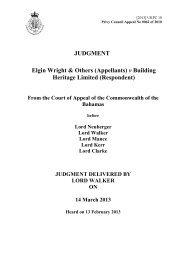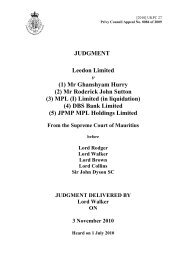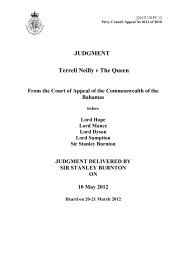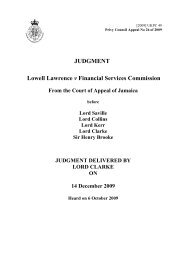The Attorney General of Trinidad and Tobago v Carmel Smith
The Attorney General of Trinidad and Tobago v Carmel Smith
The Attorney General of Trinidad and Tobago v Carmel Smith
Create successful ePaper yourself
Turn your PDF publications into a flip-book with our unique Google optimized e-Paper software.
[2009] UKPC 50<br />
Privy Council Appeal No 0021 <strong>of</strong> 2009<br />
JUDGMENT<br />
<strong>The</strong> <strong>Attorney</strong> <strong>General</strong> <strong>of</strong> <strong>Trinidad</strong> <strong>and</strong> <strong>Tobago</strong> v<br />
<strong>Carmel</strong> <strong>Smith</strong><br />
From the Court <strong>of</strong> Appeal <strong>of</strong> the Republic <strong>of</strong> <strong>Trinidad</strong><br />
<strong>and</strong> <strong>Tobago</strong><br />
before<br />
Lord Phillips<br />
Lord Rodger<br />
Lord Walker<br />
Lord Brown<br />
Lord Mance<br />
JUDGMENT DELIVERED BY<br />
LORD WALKER<br />
ON<br />
14 December 2009<br />
Heard on 13 October 2009
Appellant<br />
James Guthrie QC<br />
(Instructed by Charles<br />
Russell LLP)<br />
Respondent<br />
Sir Fenton Ramsahoye SC<br />
An<strong>and</strong> Ramlogan<br />
(Instructed by Bankside<br />
Law)
LORD WALKER<br />
<strong>The</strong> issue<br />
1. This appeal turns on a procedural issue, that is the proper party to be defendant<br />
to a claim for constitutional redress under section 14 <strong>of</strong> the Constitution <strong>of</strong> <strong>Trinidad</strong><br />
<strong>and</strong> <strong>Tobago</strong>. <strong>The</strong> claim alleges that the Statutory Authorities Service Commission<br />
(“SASC”) discriminated against Mrs <strong>Carmel</strong> <strong>Smith</strong> (who is the claimant, <strong>and</strong> the<br />
respondent to this appeal) <strong>and</strong> treated her unequally in violation <strong>of</strong> her rights under<br />
section 4(b) (equality before the law) <strong>and</strong> (d) (equality <strong>of</strong> treatment by a public<br />
authority).<br />
2. Although the events complained <strong>of</strong> occurred more than seven years ago, <strong>and</strong><br />
there have been previous proceedings by way <strong>of</strong> judicial review, the merits <strong>of</strong> the<br />
claim have still to be investigated. Nothing in this judgment should be taken as<br />
expressing any view on the merits. <strong>The</strong> factual background is sufficiently summarised<br />
by recording that from 1996 Mrs <strong>Smith</strong> was the Acting Director <strong>of</strong> the National<br />
Lotteries Control Board (“NLCB”) which she had joined as Secretary to the Board <strong>of</strong><br />
Directors in 1989. In 2000 she was formally appointed as Deputy Director but<br />
remained as Acting Director. In August 2002 she was on an extended period <strong>of</strong><br />
vacation when she received a letter from the Chairman telling her to remain on<br />
vacation leave because accountants’ reports had provided “evidence <strong>of</strong> matters <strong>of</strong><br />
concern, which bear on the performance <strong>of</strong> your duties.”<br />
3. Shortly afterwards she was told that the matter had been referred to SASC, <strong>and</strong><br />
on 2 September 2002 an executive <strong>of</strong>ficer <strong>of</strong> SASC wrote to her referring to an<br />
allegation <strong>of</strong> misconduct. <strong>The</strong> letter stated:<br />
“In accordance with the provisions <strong>of</strong> Regulation 88(1) <strong>and</strong> (2)<br />
<strong>of</strong> the Statutory Authorities’ Service Commission Regulations<br />
Chapter 24: 01, the Statutory Authorities’ Service Commission<br />
has directed that you cease to report for duty with effect from<br />
August 5, 2002, until further notice.”<br />
<strong>The</strong>re was then considerable delay (a matter which was ventilated in the judicial<br />
review proceedings but is not relevant to this appeal). On 31 March 2004 Mrs <strong>Smith</strong><br />
received from SASC a formal charge under Regulation 90(6) <strong>of</strong> the SASC<br />
Regulations:<br />
“Statement <strong>of</strong> Charge;<br />
Misconduct contrary to an implied term in your contract <strong>of</strong><br />
employment;<br />
Particulars <strong>of</strong> Charge:<br />
Page 1
That you, <strong>Carmel</strong> <strong>Smith</strong>, Deputy Director, National Lotteries<br />
Control Board did an act in breach <strong>of</strong> an implied term <strong>of</strong> your<br />
contract <strong>of</strong> employment namely not to exercise your authority<br />
unreasonably when during 2000 <strong>and</strong> 2002 you received a<br />
benefit above <strong>and</strong> beyond your entitlement as acting Director,<br />
by accepting <strong>and</strong> using motor vehicle registration number PBJ<br />
3133 while enjoying an upkeep allowance on your personally<br />
owned motor vehicle.”<br />
On 16 April 2004 Mrs <strong>Smith</strong> wrote formally denying the charge.<br />
4. On 31 March 2006 Mrs <strong>Smith</strong> issued an originating motion claiming redress<br />
under section 14 <strong>of</strong> the Constitution. Her affidavit in support <strong>of</strong> the motion referred,<br />
in support <strong>of</strong> her allegation <strong>of</strong> discrimination, to SASC’s decision not to suspend<br />
another (less senior) male employee <strong>of</strong> NLCB against whom SASC had at the end <strong>of</strong><br />
2005 brought seven separate charges <strong>of</strong> sexual harassment (all these incidents having<br />
allegedly occurred in August 2004 <strong>and</strong> involving a single female employee).<br />
5. <strong>The</strong> <strong>Attorney</strong> <strong>General</strong> <strong>of</strong> <strong>Trinidad</strong> <strong>and</strong> <strong>Tobago</strong> was made the sole defendant to<br />
Mrs <strong>Smith</strong>’s originating motion. He objected that (although entitled to be given<br />
notice <strong>of</strong> the proceedings, under section 3 <strong>of</strong> the Supreme Court <strong>of</strong> Judicature Act,<br />
Chapter 4: 01) he could not be made a party without his consent, <strong>and</strong> that the proper<br />
defendant was SASC. This point was heard as a preliminary issue. On 18 February<br />
2008 Moosai J upheld the <strong>Attorney</strong> <strong>General</strong>’s objection <strong>and</strong> gave leave for the<br />
amendment <strong>of</strong> the proceedings, striking out the <strong>Attorney</strong> <strong>General</strong> <strong>and</strong> adding SASC.<br />
On 21 July 2008 the Court <strong>of</strong> Appeal (Hamel-<strong>Smith</strong>, Kangaloo <strong>and</strong> Weekes JJA)<br />
allowed Mrs <strong>Smith</strong>’s appeal <strong>and</strong> struck out the judge’s order, so that the <strong>Attorney</strong><br />
<strong>General</strong> again became the sole defendant in place <strong>of</strong> SASC. <strong>The</strong> <strong>Attorney</strong> <strong>General</strong><br />
appeals to the Board with final leave granted on 2 February 2009.<br />
6. It is a matter for regret that considerable delay <strong>and</strong> expense has been incurred<br />
over this purely procedural point, with the substance <strong>of</strong> Mrs <strong>Smith</strong>’s claim being held<br />
in suspense. <strong>The</strong> procedural point is however <strong>of</strong> some importance to both parties.<br />
<strong>The</strong> <strong>Attorney</strong> <strong>General</strong> wishes to have the law clarified, to avoid similar delay <strong>and</strong><br />
expense in future proceedings for constitutional redress. Mrs <strong>Smith</strong> has anxieties<br />
(whether or not well-founded) about the recovery <strong>of</strong> any damages <strong>and</strong> costs that may<br />
eventually be awarded to her, if the <strong>Attorney</strong> <strong>General</strong> himself is not a party to the<br />
proceedings.<br />
Relevant provisions <strong>of</strong> the Constitution<br />
7. <strong>The</strong> Constitution <strong>of</strong> <strong>Trinidad</strong> <strong>and</strong> <strong>Tobago</strong> came into force on 1 August 1976.<br />
Chapter 1 (Recognition <strong>and</strong> protection <strong>of</strong> fundamental human rights <strong>and</strong> freedoms)<br />
contains sections 4 <strong>and</strong> 14, to which reference has already been made. Section 14<br />
(Enforcement <strong>of</strong> the protective provisions) provides:<br />
Page 2
“(1) For the removal <strong>of</strong> doubts it is hereby declared that if any<br />
person alleges that any <strong>of</strong> the provisions <strong>of</strong> this Chapter has<br />
been, is being, or is likely to be contravened in relation to him,<br />
then without prejudice to any other action with respect to the<br />
same matter which is lawfully available, that person may apply<br />
to the High Court for redress by way <strong>of</strong> originating the motion.<br />
(2) <strong>The</strong> High Court shall have original jurisdiction<br />
(a) to hear <strong>and</strong> determine any application made by any<br />
person in pursuance <strong>of</strong> subsection (1); <strong>and</strong><br />
(b) to determine any question arising in the case <strong>of</strong> any<br />
person which is referred to it in pursuance <strong>of</strong><br />
subsection (4),<br />
<strong>and</strong> may, subject to subsection (3), make such orders,<br />
issue such writs <strong>and</strong> give such directions as it may<br />
consider appropriate for the purpose <strong>of</strong> enforcing, or<br />
securing the enforcement <strong>of</strong>, any <strong>of</strong> the provisions <strong>of</strong><br />
this Chapter to the protection <strong>of</strong> which the person<br />
concerned is entitled.<br />
(3) <strong>The</strong> State Liability <strong>and</strong> Proceedings Act shall have effect<br />
for<br />
the purpose <strong>of</strong> any proceedings under this section.”<br />
<strong>The</strong> State Liability <strong>and</strong> Proceedings Act (Chapter 8: 02) is concerned with<br />
proceedings by <strong>and</strong> against the State. <strong>The</strong> Judicial Committee has considered the<br />
effect <strong>of</strong> section 14(3) in Durity v <strong>Attorney</strong> <strong>General</strong> <strong>of</strong> <strong>Trinidad</strong> <strong>and</strong> <strong>Tobago</strong> [2003] 1<br />
AC 405, explaining (para 24 <strong>of</strong> the judgment delivered by Lord Nicholls):<br />
“On this the first point to note is that the express but general<br />
reference to the State Liability <strong>and</strong> Proceedings Act in section<br />
14(3) <strong>of</strong> the Constitution cannot be read as meaning that every<br />
provision <strong>of</strong> that Act is incorporated into the Constitution for<br />
the purposes <strong>of</strong> constitutional proceedings . . . Thus, section<br />
14(3) <strong>of</strong> the Constitution has to be read as applying to<br />
constitutional proceedings such <strong>of</strong> the provisions <strong>of</strong> the State<br />
Liability <strong>and</strong> Proceedings Act as are capable <strong>of</strong> being applied<br />
for this purpose.”<br />
Page 3
8. Section 76(2) <strong>of</strong> the Constitution provides for the <strong>of</strong>fice <strong>of</strong> <strong>Attorney</strong> <strong>General</strong>:<br />
“<strong>The</strong> <strong>Attorney</strong> <strong>General</strong> shall, subject to section 79 [relating to<br />
temporary incapacity], be responsible for the administration <strong>of</strong><br />
legal affairs in <strong>Trinidad</strong> <strong>and</strong> <strong>Tobago</strong> <strong>and</strong> legal proceedings for<br />
<strong>and</strong> against the State shall be taken –<br />
(a) in the case <strong>of</strong> civil proceedings, in the name <strong>of</strong> the <strong>Attorney</strong><br />
<strong>General</strong>;<br />
(b) in the case <strong>of</strong> criminal proceedings, in the name <strong>of</strong> the<br />
State”.<br />
In the Constitution the expression “the State” is not defined (other than by reference to<br />
its geographical extent in section 1(2)). Nor is the expression “civil proceedings”<br />
defined; in particular, there is no restrictive definition such as is found in the State<br />
Liability <strong>and</strong> Proceedings Act (para 12 below).<br />
9. <strong>The</strong>re are some other definition provisions in the Constitution that may be<br />
relevant, although they were not relied on in counsel’s submissions. In section 3(1)<br />
“public <strong>of</strong>fice” <strong>and</strong> “public <strong>of</strong>ficer” are defined by reference (directly or indirectly) to<br />
the public service, which is defined, subject to subsections (4) <strong>and</strong> (5), as service in a<br />
civil capacity <strong>of</strong> the Government <strong>of</strong> <strong>Trinidad</strong> <strong>and</strong> <strong>Tobago</strong> (or <strong>of</strong> the <strong>Tobago</strong> House <strong>of</strong><br />
Assembly). “Service Commission” means the Judicial <strong>and</strong> Legal Service<br />
Commission, the Public Service Commission, the Police Service Commission <strong>and</strong> the<br />
Teaching Service Commission. Section 3(4) provides that a person shall not be<br />
considered to hold an <strong>of</strong>fice in the public service by reason only that<br />
“(b) he holds the <strong>of</strong>fice <strong>of</strong> –”<br />
. . .<br />
(iii) Ombudsman or member <strong>of</strong> the Integrity Commission or<br />
member <strong>of</strong> any other Commission established by this<br />
Constitution;<br />
. . .<br />
(v) member <strong>of</strong> any board, commission, committee or<br />
similar body, whether incorporated or not, established by any<br />
enactment.”<br />
10. <strong>The</strong> Constitution provides for the establishment <strong>and</strong> functioning <strong>of</strong> a number <strong>of</strong><br />
Commissions to oversee appointments, promotions, removals <strong>and</strong> terms <strong>of</strong> service for<br />
those working in the public sector in <strong>Trinidad</strong> <strong>and</strong> <strong>Tobago</strong>. <strong>The</strong>se are the four Service<br />
Commissions already mentioned, that is the Judicial <strong>and</strong> Legal Service Commission<br />
(Chapter 7, sections 110-111); <strong>and</strong> (all in Chapter 9, sections 120-129) the Public<br />
Page 4
Service Commission, the Police Service Commission <strong>and</strong> the Teaching Service<br />
Commission. <strong>The</strong>re are two Commissions with more limited <strong>and</strong> specialised<br />
functions, the Integrity Commission (Chapter 10, sections 138-139) <strong>and</strong> the Salaries<br />
Review Commission (Chapter 11, sections 140-141). <strong>The</strong>re is also a Public Service<br />
Appeal Board (Chapter 9, sections 130-137). Some at least <strong>of</strong> these Commissions had<br />
been in existence before the coming into force <strong>of</strong> the present Constitution in 1976.<br />
None <strong>of</strong> them appears to be a corporate body.<br />
11. Lord Diplock has described the constitutional purpose <strong>of</strong> these Commissions in<br />
an appeal relating to the former (1962) Constitution, Thomas v <strong>Attorney</strong> <strong>General</strong> <strong>of</strong><br />
<strong>Trinidad</strong> <strong>and</strong> <strong>Tobago</strong> [1982] AC 113, 124:<br />
“<strong>The</strong> whole purpose <strong>of</strong> Chapter VIII <strong>of</strong> the Constitution which<br />
bears the rubric ‘<strong>The</strong> Public Service’ is to insulate members <strong>of</strong><br />
the civil service, the teaching service <strong>and</strong> the police service in<br />
<strong>Trinidad</strong> <strong>and</strong> <strong>Tobago</strong> from political influence exercised directly<br />
upon them by the government <strong>of</strong> the day. <strong>The</strong> means adopted<br />
for doing this was to vest in autonomous commissions, to the<br />
exclusion <strong>of</strong> any other person or authority, power to make<br />
appointments to the relevant service, promotions <strong>and</strong> transfers<br />
within the service <strong>and</strong> power to remove <strong>and</strong> exercise<br />
disciplinary control over members <strong>of</strong> the service. <strong>The</strong>se<br />
autonomous commissions, although public authorities, are<br />
excluded by section 105(4)(c) from forming part <strong>of</strong> the service<br />
<strong>of</strong> the Crown.”<br />
Section 3(4) <strong>of</strong> the present Constitution is the counterpart <strong>of</strong> section 105(4)(c) <strong>of</strong> the<br />
former Constitution.<br />
Other statutory provisions<br />
12. <strong>The</strong> SASC was established by the State Authorities Act (Chapter 24:01). That<br />
Act was enacted in 1966 <strong>and</strong> came into force on 1 January 1967. It was therefore in<br />
existence several years before the present Constitution came into force, but it is not<br />
mentioned in the Constitution. <strong>The</strong> functions <strong>of</strong> the SASC (tersely set out in section<br />
5) are exercisable in relation to <strong>of</strong>ficers (that is, under the definition in section 2,<br />
pensionable, monthly paid personnel) <strong>of</strong> statutory authorities as defined in the same<br />
section:<br />
“‘Statutory Authority’ means a local authority <strong>and</strong> any<br />
commission, board, committee, council or body (whether<br />
corporate or unincorporated) established by or under an Act<br />
other than the Companies Ordinance declared by the President<br />
under section 3 to be subject to the provisions <strong>of</strong> this Act.”<br />
Page 5
Section 3 gives no further guidance as to the principles on which the President should<br />
exercise his power to make such a declaration, but the context (<strong>and</strong> the word<br />
“authority” itself) indicate that statutory authorities are to be statutory bodies<br />
operating in the public sector <strong>and</strong> exercising some degree <strong>of</strong> control over particular<br />
activities (such as the supervision <strong>of</strong> the national lottery exercised by the NLCB). In<br />
short SASC’s functions in relation to statutory authorities are similar to those<br />
exercisable by the four Service Commissions in relation to the respective branches <strong>of</strong><br />
the public sector for which the Constitution gives them responsibility. <strong>The</strong> SASC,<br />
like the other Service Commissions, the Integrity Commission <strong>and</strong> the Salaries<br />
Review Commission, is not established as a corporate body.<br />
13. <strong>The</strong> State Liability <strong>and</strong> Proceedings Act (originally named the Crown Liability<br />
<strong>and</strong> Proceedings Act) was enacted in 1966 <strong>and</strong> came into force on 28 September 1968<br />
(so that it too antedates the present Constitution, <strong>and</strong> the reference to it in section<br />
14(3) has appeared in the Constitution since its inception). Section 2(1) contains some<br />
definitions to which reference was made in argument:<br />
“‘agent’ in relation to the State includes an independent<br />
contractor employed by the State but does not include a<br />
statutory corporation except where the State has entered into an<br />
express contract <strong>of</strong> agency with the corporation;<br />
‘civil proceedings’ includes proceedings in the High Court <strong>of</strong><br />
Justice or a petty civil court for the recovery <strong>of</strong> fines or<br />
penalties, but does not include proceedings analogous to<br />
proceedings on the Crown side <strong>of</strong> the Queen’s Bench Division<br />
in Engl<strong>and</strong>;<br />
. . .<br />
‘servant’ in relation to the State, includes an <strong>of</strong>ficer who is a<br />
member <strong>of</strong> the public service <strong>and</strong> any servant <strong>of</strong> the State, . . .<br />
[but does not include] –<br />
. . .<br />
(f) any <strong>of</strong>ficer, employee or servant <strong>of</strong> a statutory corporation;<br />
Page 6
. . .<br />
‘the State’ means the Republic <strong>of</strong> <strong>Trinidad</strong> <strong>and</strong> <strong>Tobago</strong>.”<br />
<strong>The</strong> definition <strong>of</strong> “agent” is relevant mainly to section 4 (liability <strong>of</strong> the State in tort)<br />
<strong>and</strong> does not assist the resolution <strong>of</strong> this appeal. Section 2(3) provides:<br />
“Any reference in Parts III or IV to civil proceedings by or<br />
against the State, or to civil proceedings to which the State is a<br />
party, shall be construed as including a reference to civil<br />
proceedings to which the <strong>Attorney</strong> <strong>General</strong> is a party; but the<br />
State shall not for the purposes <strong>of</strong> Parts III <strong>and</strong> IV be deemed to<br />
be a party to any proceedings by reason only that they are<br />
brought by the <strong>Attorney</strong> <strong>General</strong> upon the relation <strong>of</strong> some<br />
other person.”<br />
Parts III <strong>and</strong> IV <strong>of</strong> the Act deal with matters such as enforcement, discovery <strong>and</strong><br />
limitation. Section 2(3) does not therefore amount to a general widening <strong>of</strong> the<br />
concept <strong>of</strong> proceedings by or against the State, nor is it circular (as it might be if it<br />
applied for the purposes <strong>of</strong> Part II <strong>of</strong> the Act).<br />
14. Section 19 <strong>of</strong> the Act is <strong>of</strong> central importance. Counsel for Mrs <strong>Smith</strong> based<br />
their argument on section 19(2):<br />
“Subject to this Act <strong>and</strong> to any other written law, proceedings<br />
against the State shall be instituted against the <strong>Attorney</strong><br />
<strong>General</strong>.”<br />
<strong>The</strong>y contended that SASC’s actions are the actions <strong>of</strong> the State, nonetheless because<br />
<strong>of</strong> its independence from Government control. Against that counsel for the <strong>Attorney</strong><br />
<strong>General</strong> relied on section 19(8) <strong>and</strong> (9), added by amendment in 1998:<br />
“(8) Proceedings against an authority established by the<br />
Constitution or a member there<strong>of</strong> arising out <strong>of</strong> or in<br />
connection with the exercise <strong>of</strong> the powers <strong>of</strong> the authority or<br />
the performance <strong>of</strong> its functions or duties are deemed to be<br />
proceedings against the State.<br />
(9) In this section, ‘authority’ means a Service<br />
Commission as defined in section 3(1) <strong>of</strong> the Constitution.”<br />
Counsel for the <strong>Attorney</strong> <strong>General</strong> rely on an implicit but clear distinction between the<br />
four Service Commissions referred to in section 19(9), on the one h<strong>and</strong>, <strong>and</strong> the<br />
Page 7
Integrity Commission, the Salaries Review Commission <strong>and</strong> the SASC, on the other<br />
h<strong>and</strong>.<br />
15. <strong>The</strong> Act has one puzzling complication that needs to be noted, but only in order<br />
to clear it out <strong>of</strong> the way. Apart from the definition <strong>of</strong> “civil proceedings” in section 2<br />
(1) <strong>and</strong> the special provisions in section 2 (3), section 25 contains further provisions<br />
limiting the meaning <strong>of</strong> “civil proceedings” for the purposes <strong>of</strong> Part II only (which<br />
includes section 19). <strong>The</strong>se provisions are obscure, but their most important practical<br />
effect is that judicial review proceedings may still be brought, despite section 19 (8)<br />
<strong>and</strong> (9), against any <strong>of</strong> the Service Commissions in its own name. But they do not<br />
have that effect in relation to a motion for constitutional relief under section 14 <strong>of</strong> the<br />
Constitution.<br />
State responsibility<br />
16. <strong>The</strong> proper scope <strong>and</strong> function <strong>of</strong> the State is a topic which has engaged<br />
political philosophers for many centuries. In the context <strong>of</strong> English law the concept <strong>of</strong><br />
the State has traditionally been associated with the Crown, <strong>and</strong> the public service with<br />
Crown Service. Although <strong>Trinidad</strong> <strong>and</strong> <strong>Tobago</strong> has been a republic for over 30 years<br />
its Constitution still reflects this historical background. <strong>The</strong> traditional approach has<br />
always been that Crown Service is limited to the military or civil service <strong>of</strong> central<br />
government. Those employed in local government or statutory corporations are<br />
working in the public sector (a much wider expression) but are not in Crown service.<br />
Denning LJ summarised the position in Tamlin v Hannaford [1950] 1KB 18, a case<br />
concerned with the British Transport Commission, which took over the British<br />
railway industry when it was nationalised by the Transport Act 1947. After referring<br />
to the Minister’s power to give general policy directions to the Commission, Denning<br />
LJ said (at p24):<br />
“<strong>The</strong>se are great powers but still we cannot regard the<br />
corporation as being his agent, any more than a company is the<br />
agent <strong>of</strong> the shareholders, or even <strong>of</strong> a sole shareholder. In the<br />
eye <strong>of</strong> the law, the corporation is its own master <strong>and</strong> is<br />
answerable as fully as any other person or corporation. It is not<br />
the Crown <strong>and</strong> has none <strong>of</strong> the immunities or privileges <strong>of</strong> the<br />
Crown. Its servants are not civil servants, <strong>and</strong> its property is<br />
not Crown property.”<br />
17. In the last generation the influence <strong>of</strong> European law has produced new contexts<br />
in which a broader concept <strong>of</strong> state responsibility is called for. <strong>The</strong> Court <strong>of</strong> Justice <strong>of</strong><br />
the European Communities has held that a body such as a statutory hospital authority<br />
or a statutory gas corporation is an “emanation <strong>of</strong> the state” so as to found state<br />
responsibility for its shortcomings in compliance with European directives: Marshall<br />
v Southampton <strong>and</strong> South West Hampshire Area Health Authority [1986] QB 401;<br />
Foster v British Gas Plc [1991] 1 QB 405. <strong>The</strong> same approach <strong>of</strong> broadening state<br />
responsibility for failure to respect human rights underlies the concept <strong>of</strong> “public<br />
Page 8
authority” in the United Kingdom Human Rights Act 1998. Marshall <strong>and</strong> Fisher<br />
were referred to in the impressive judgment <strong>of</strong> Aboud J (Ag) in Boxhill v Port<br />
Authority <strong>of</strong> <strong>Trinidad</strong> <strong>and</strong> <strong>Tobago</strong> (2004) on the issue <strong>of</strong> whether the Port Authority is<br />
a public authority within the meaning <strong>of</strong> section 4(d) <strong>of</strong> the Constitution. But that is a<br />
different <strong>and</strong> broader issue than the procedural issue now before the Board. <strong>The</strong><br />
procedural issue is one <strong>of</strong> statutory construction which depends on the language <strong>of</strong> the<br />
Constitution <strong>and</strong> the State Liability <strong>and</strong> Proceedings Act, construed in a purposive <strong>and</strong><br />
practical way.<br />
18. When the new Constitution was being drafted <strong>and</strong> considered the Service<br />
Commissions were already in existence, carrying out the important functions<br />
described by Lord Diplock in Thomas v <strong>Attorney</strong> <strong>General</strong> <strong>of</strong> <strong>Trinidad</strong> <strong>and</strong> <strong>Tobago</strong>.<br />
SASC was already in existence carrying out similar functions in relation to statutory<br />
authorities. <strong>The</strong> fact that the former but not the latter were given constitutional status<br />
may reflect Parliament’s view that the functions <strong>of</strong> the Service Commissions are<br />
closer to what are sometimes called “core functions”. That view would tend to be<br />
confirmed by the amendments to section 19 <strong>of</strong> the State Liability <strong>and</strong> Proceedings Act<br />
made by Parliament in 1998. But whether or not that is correct (<strong>and</strong> whether or not<br />
the amendments were inspired by the Judicial Committee’s decision in Rees v Crane<br />
[1994] 2 AC 173) it is inconceivable that Parliament did not have it well in mind, in<br />
making the amendments, that they were making an important procedural distinction<br />
between the four Service Commissions, on the one h<strong>and</strong>, <strong>and</strong> the Integrity<br />
Commission, the Salaries Review Commission, <strong>and</strong> the SASC, on the other h<strong>and</strong>.<br />
Lack <strong>of</strong> incorporation<br />
19. In his spirited address following his leader, Mr Ramlogan placed great<br />
emphasis on the fact that SASC is an unincorporated body. This point seems not to<br />
have been taken below (indeed the judge recorded in paragraph 20 <strong>of</strong> his judgment, “it<br />
is common ground that the SASC is a legal entity capable <strong>of</strong> being sued”).<br />
Nevertheless it must be considered to see whether it has any merit.<br />
20. In the Board’s opinion the point has no merit. An unincorporated body (by<br />
definition) has no legal personality, <strong>and</strong> can sue or be sued only through one or more<br />
natural persons representing it. But this happens as a matter <strong>of</strong> course both in private<br />
law (where partners, clubs, trustees <strong>and</strong> personal representatives are <strong>of</strong>ten parties to<br />
litigation) <strong>and</strong> in public law (where unincorporated authorities <strong>of</strong> all sorts, including<br />
tribunals, school governors, <strong>and</strong> visitors to educational charities) are <strong>of</strong>ten parties to<br />
judicial review or other proceedings. A striking example is the well-known case <strong>of</strong> R<br />
v Panel on Take-overs <strong>and</strong> Mergers ex parte Datafin Plc [1987] 1 QB 815, in which<br />
Sir John Donaldson observed at the beginning <strong>of</strong> his judgment (at pp 824-825):<br />
“<strong>The</strong> Panel is an unincorporated association without legal<br />
personality <strong>and</strong>, so far as can be seen, has only about 12<br />
members. [<strong>The</strong> members were then identified] It has no<br />
statutory, prerogative or common law powers <strong>and</strong> it is not in<br />
Page 9
contractual relationship with the financial market or with those<br />
who deal in that market.”<br />
Nevertheless the Panel was amenable to judicial review.<br />
21. It should perhaps be added, for completeness, that if an unincorporated body<br />
has only a shadowy existence that may be a reason for the Court to refuse to allow it<br />
to be represented, either in judicial review or any other proceedings. As Mr Ockleton<br />
said when sitting as a deputy High Court judge in Proud v Buckingham Pub Watch<br />
Scheme [2008] EWHC 224 (Admin), quoted in R (Boyle) v Haverhill Pub Watch<br />
[2009] EWHC 2441 (Admin), para 38:<br />
“It seems to me in the highest degree unlikely that an entity<br />
which has . . . no constitution, no finances, no fixed<br />
membership, no rules <strong>and</strong> whose decisions are binding on its<br />
members only to the extent that they treat them as binding, on<br />
which again there are no rules – that an entity <strong>of</strong> that sort can<br />
be amenable to judicial review or can be a person exercising<br />
public functions under section 6 <strong>of</strong> the Human Rights Act.”<br />
But that has no application to this case. SASC is a statutory body with functions,<br />
powers <strong>and</strong> responsibilities clearly defined by Parliament.<br />
Capacity to pay<br />
22. Mr Ramlogan also relied on the practicalities <strong>of</strong> the matter. He submitted that<br />
even if SASC was to be reinstated as a defendant, the <strong>Attorney</strong> <strong>General</strong> should remain<br />
as a party in order to ensure that Mrs <strong>Smith</strong>, if ultimately successful, would be able to<br />
recover any damages <strong>and</strong> costs awarded to her. He drew attention to the decision <strong>of</strong><br />
the Judicial Committee in Jhagroo v Teaching Service Commission [2002] UKPC 63,<br />
in which (para 45) it was accepted by both sides that any damages awarded would be<br />
payable by the Government <strong>of</strong> <strong>Trinidad</strong> <strong>and</strong> <strong>Tobago</strong>, rather than the Teaching Service<br />
Commission.<br />
23. Mr Guthrie QC (for the <strong>Attorney</strong> <strong>General</strong>) did not quarrel with the suggestion<br />
that lawyers in his department might continue to be involved in the case in any event,<br />
<strong>and</strong> indicated that any damages <strong>and</strong> costs awarded were likely (Mr Guthrie went no<br />
further than that) to be met through his department. It may be that individual<br />
members <strong>of</strong> SASC (as well as Mrs <strong>Smith</strong>) will want to take that matter further with<br />
the <strong>Attorney</strong> <strong>General</strong>’s Department. <strong>The</strong>se considerations cannot however carry<br />
weight in the determination <strong>of</strong> the issue <strong>of</strong> statutory construction, as against the<br />
scheme <strong>and</strong> language <strong>of</strong> the State Liability <strong>and</strong> Proceedings Act.<br />
Page 10
Conclusion<br />
24. In the Board’s opinion the scheme <strong>and</strong> language are clear. <strong>The</strong> <strong>Attorney</strong><br />
<strong>General</strong> is to represent the State (in effect, Central Government). <strong>The</strong> <strong>Attorney</strong><br />
<strong>General</strong> is also to represent (except in judicial review proceedings) statutory bodies<br />
which (presumably because <strong>of</strong> their core functions) are deemed by section 19(8) <strong>and</strong><br />
(9) to be part <strong>of</strong> the State. Other statutory bodies, even if public authorities amenable<br />
to constitutional redress proceedings under section 14 <strong>of</strong> the Constitution, are not part<br />
<strong>of</strong> the State, <strong>and</strong> are not deemed to be part <strong>of</strong> the State.<br />
25. <strong>The</strong> Board will therefore allow the appeal <strong>and</strong> reinstate the order <strong>of</strong> Moosai J.<br />
<strong>The</strong> parties have 14 days in which to submit written submissions as to costs.<br />
Page 11


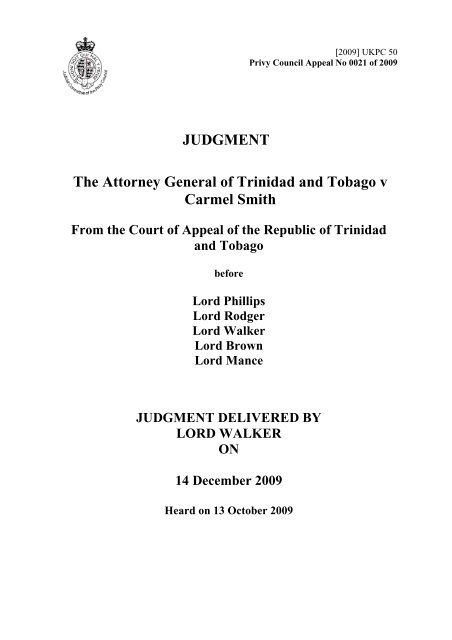
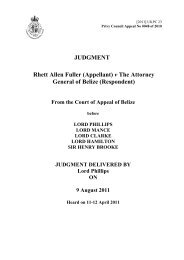
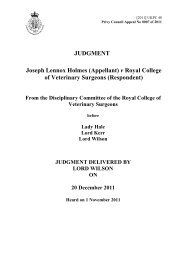
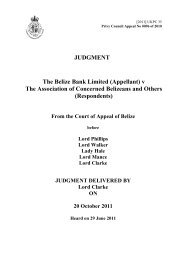
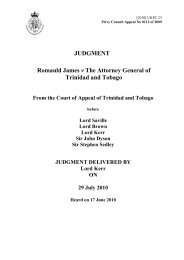
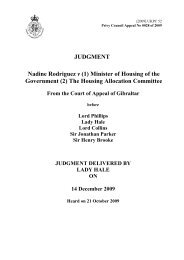
![[2011] UKPC 10 - Judicial Committee of the Privy Council](https://img.yumpu.com/23644185/1/184x260/2011-ukpc-10-judicial-committee-of-the-privy-council.jpg?quality=85)
